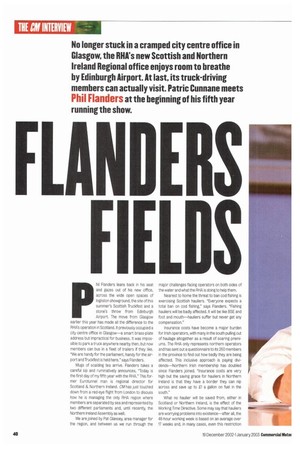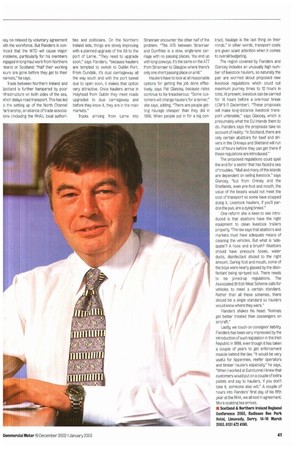FLAN RS F
Page 40

Page 41

If you've noticed an error in this article please click here to report it so we can fix it.
No longer stuck in a cramped city centre office in Glasgow, the RHA's new Scottish and Northern Ireland Regional office enjoys room to breathe by Edinburgh Airport. At last, its truck-driving members can actually visit. Patric Cunnane meets
Phil Flanders at the beginning of his fifth year running the show.
phil Flanders leans back in his seat and gazes out of his new office, across the wide open spaces of Ingliston showground, the site of this summer's Scottish Truckfest and a stone's throw from Edinburgh Airport. The move from Glasgow earlier this year has made all the difference to the RHA's operation in Scotland. it previously occupied a ctty centre office in Glasgow—a smart brass-plate address but impractical for business. It was impossible to park a truck anywhere nearby then, but now members can bus in a fleet of trailers if they like. "We are handy for the parliament, handy for the airport and Truckfest is held here," says Flanders.
Mugs of scalding tea arrive. Flanders takes a careful sip and ruminatively announces, "Today is the first day of my fifth year with the RHA." This former Eurotunnel man is regional director for Scotland & Northern Ireland. CM has just touched down from a red-eye flight from London to discuss how he is managing the only RHA region where members are separated by sea and represented by two different parliaments and, until recently the Northern Ireland Assembly as well.
We are joined by Pat Glancey, area manager for the region, and between us we run through the
major challenges facing operators on both sides of the water and what the RHA is doing to help them.
Nearest to home the threat to ban cod fishing is exercising Scottish hauliers. "Everyone expects a total ban on cod fishing," says Flanders. "Fishing hauliers will be badly affected. It will be like BSE and foot and mouth—hauliers suffer but never get any compensation."
Insurance costs have become a major burden for Irish operators, with many in the south pulling out of haulage altogether as a result of soaring premiums. The RHA only represents northern operators and has sent out a questionnaire to its 260 members in the province to find out how badly they are being affected. This inclusive approach is paying dividends—Northern Irish membership has doubled since Flanders joined. "Insurance costs are very high but the saving grace for hauliers in Northern Ireland is that they have a border they can nip across and save up to El a gallon on fuel in the south."
What no haulier will be saved from, either in Scotland or Northern Ireland, is the effect of the Working Time Directive. Some may say that hauliers are worrying problems into existence—after all, the 4B-hour working week is based on an average over 17 weeks and, in many cases, even this restriction
nay be relaxed by voluntary agreement vith the workforce. But Flanders is conteed that the WTD will cause major moblems, particularly for his members ingaged in long-haul work from Northern -eland or Scotland: "Half their working lours are gone before they get to their narkets," he says.
Trade between Northern Ireland and ;Gotland is further hampered by poor nfrastructure on both sides of the sea, vhich delays road transport. This has led o the setting up of the North Channel 'artnership, an alliance of trade associaions (including the RHA), local authori
ties and politicians. On the Northern Ireland side, things are slowly improving with a planned upgrade of the AB to the port of Larne. "They need to upgrade soon," says Flanders, "because hauliers are tempted to switch to Dublin Port. From Dundalk, it's dual carriageway all the way south and with the port tunnel due to open soon, it makes that option very attractive. Once hauliers arrive in Holyhead from Dublin they meet roads upgraded to dual carriageway and before they know it, they are in the main markets."
Trucks arriving from Lame into Stranraer encounter the other half of the problem. "The A75 between Stranraer and Dumfries is a slow, single-lane carriage with no passing pieces. You end up with long convoys. It's the same on the A77 from Stranraer to Glasgow where there's only one short passing place on a hill."
Hauliers have to look at all reasonable options for getting the job done effectively, says Pat Glancey, because rates continue to be treacherous: "Some customers will change hauliers for a tenner," she says, adding, "There are people getting haulage cheaper than they did in 1996. When people put in for a big con
tract, haulage is the last thing on their minds." In other words, transport costs are given scant attention when it comes to overall budgeting.
The region covered by Flanders and Glancey includes an unusually high number of livestock hauliers, so naturally the pair are worried about proposed new livestock regulations which could cut maximum journey times to 12 hours in total. At present, livestock can be carried for 14 hours before a one-hour break (CM 5-11 December). "These proposals will make long-distance livestock transport untenable," says Glancey, which is presumably what the EU intends them to do. Flanders says the proposals take no account of reality: "In Scotland, there are only certain abattoirs for beef and drivers in the Orkneys and Shetland will run out of hours before they can get there if these regulations are introduced."
The proposed regulations could spell the end for a sector that has faced a sea of troubles. "Mull and many of the islands are dependent on selling livestock," says Glancey, "but from Orkney and the Shetlands, even pre-foot and mouth, the value of the beasts would not meet the cost of transport so some have stopped doing it. Livestock hauliers, if you'll pardon the pun, are a dying breed."
One reform she is keen to see introduced is that abattoirs have the right equipment to clean livestock trailers properly. "The law says that abattoirs and markets must have adequate means of cleaning the vehicles. But what is 'adequate'? A hose and a brush? Abattoirs should have pressure hoses, water ducts, disinfectant diluted to the right amount. During foot and mouth, some of the boys were nearly gassed by the disinfectant being sprayed out. There needs to be joined-up regulations. The Associated British Meat Scheme calls for vehicles to meet a certain standard. Rather than all these schemes, there should be a single standard so hauliers would know where they were."
Flanders shakes his head: "Animals get better treated than passengers on aircraft."
Lastly, we touch on consignor liability. Flanders has been very impressed by the introduction of such legislation in the Irish Republic in 1999, even though it has taken a couple of years to get enforcement muscle behind the law. "It would be very useful for tippermen, reefer operators and timber hauliers especially," he says, "When I worked at Eurotunnel I knew that customers would put on a couple of extra pallets and say to hauliers, if you don't take tt, someone else will." A couple of hours into Flanders' first day of his fifth year at the RHA, we all nod in agreement. More scalding tea arrives.
• Scotland & Northern Ireland Regional Conference 2003, RadIsson Roe Park Hotel, Limavady, Derry. 14-16 March 2003. 0131 472 41130.
































































































































































